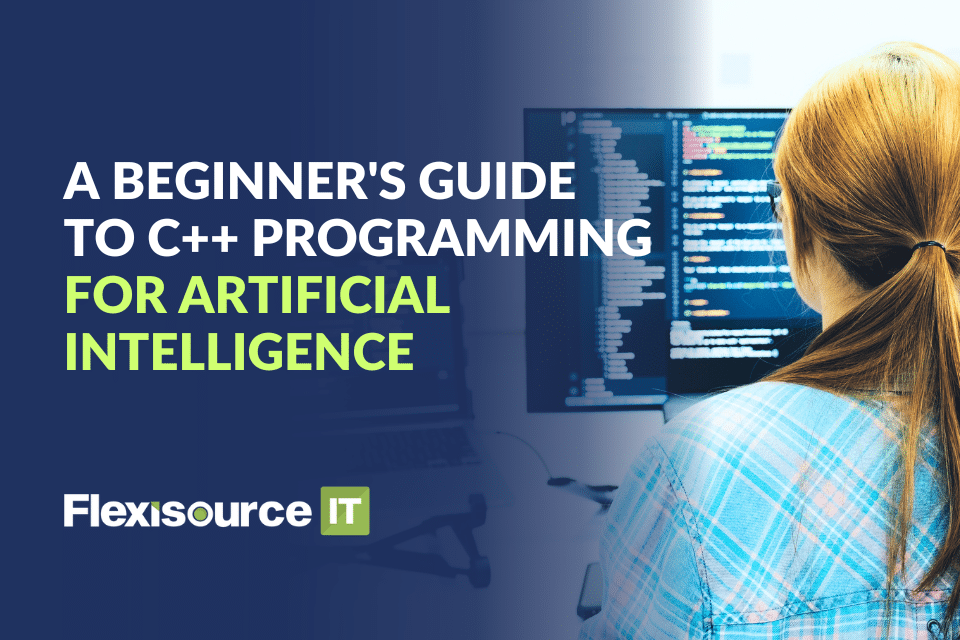As the digital age progresses, so does programming with C++ for AI. The goal of today’s tech industry is innovation and accelerated progress. This is why artificial intelligence has become an irreplaceable product in today’s society. Its ability to support professionals by optimising and streamlining productivity with its capabilities has increased efficiency in today’s society.
But how do you begin creating an AI with programming? To be more specific, how can you make AI with C++ programming?
That’s what we’re about to discuss today with this guide on how C++ is used for AI programming, why it’s being used, and what concepts you should be aware of. Take note that to grow an AI in business, you need to start from its very concepts and your necessities. So why don’t we start your journey today?
What is C++?
Before we begin your journey into using C++ programming for AI, we should first discuss what C++ is. There are many programming languages utilised by tech experts all around the world. However, one of the most advanced coding languages is C++.
C++ is a traditional programming language with high-level programming included. Bjarne Stroustrup created the program in 1979 when he could not find a scalable programming language for software development that could handle large quantities.
Because of Stroustrup’s innovation, C++ created a new path for modern programming, which now holds the weight of space exploration, air flight, special effects, websites, and search engines.
Not only does the program support much of modern civilisation programming, but it also advances it with a C++ AI course added to the list of its many applicable uses. The only downside to it is that its complexity makes it difficult to master.
How is C++ Applied in AI?
t-weight: 400;”>So how does one achieve artificial intelligence programming in C++? A big challenge to overcome is the complex algorithms C++ provides for its users. Maintaining simplicity with the programming language requires an advanced level of knowledge when utilising its properties.
However, explaining how these C++ AI projects come to fruition isn’t that difficult. Most AI developers prefer to use simpler languages like Python which prove to be exemplary for AI and machine learning methods. Still, the capabilities of C++ in terms of speed and performance don’t go unnoticed.
C++ for AI includes projects that focus on machine learning, deep learning, and computer vision. Not only does its speed and performance bring about faster results, but the computer’s processing power, space, and memory are also optimised to perform without costing too many resources.
Why C++ is Used for AI
Because of its complexity, most developers opt not to use C++ when involved with AI-related projects. It takes an exceptionally skilled developer to utilise the potential C++ has. However, should a talented developer with a masterful hand take control of the programming language to create AI, the results are outstanding.
C++ has an unrivalled processing speed, allowing it to consume and understand the large data required for AI-related projects. While Python may make an AI project with simpler instructions, the decrease in time and resources is hard to ignore with C++.
A prime example of AI projects utilising C++ can be found in game development. Gaming engines that utilise artificial intelligence rely on C++ programming for real-time choices (active battle modes) and behavioural movements that non-playable characters (NPCs) repeatedly do.
It’s not only for entertainment either. Robotics, reinforcement, and high-performance computing (HPC) also utilise C++ for AI. Robotics require low-level control, sensors, and memory. Trial and error is a crucial step for robotics and reinforcement, which is why the speed of the C++ programming language and its ability to remain efficient is the most suitable option.
Meanwhile, HPC handles AI applications and their datasets. Its size and scaling needs require C++, which can be used to manage it without complications.
C++ Concepts for AI
Since C++ is one of the most used programming languages, it’s only natural that its concepts are well-thought and studied. C++, in general, has required concepts that AI-related projects require. Below are common reasons why C++ is used for AI.
Production Code
<p>The most obvious use of AI and its requirement for C++ concept is the production code for speed and efficiency. Teams that work with robotics, self-automated vehicles, and other machinery requiring code utilise C++ because of its scalable traits that ensure accurate performance.
Deployment of Models and Data Analysis
There’s no denying the importance of data science in business. The same can be said for the C++ language. However, the correlation between the two may surprise you. Especially since it involves artificial intelligence.
Deploying models and analysing them requires maintaining and building AI infrastructures. These infrastructures can be found in software libraries that can only be understood by someone with knowledge of C++.
Hardware and Chip Industry
C++ for AI isn’t just on computer programs. It also involves hardware, which refers to the physical tech gadgets like monitors, keyboards, and headends. Both also required when creating chips for processors.
Using C++ in AI hardware is a staple for the tech industry. Most of the hardware that relies on artificial intelligence requires an efficiency and speed that only C++ can offer. An example of this is using C++ for machine learning. Core components in technology require the assistance of AI hardware.
A prime example of this is AI chips. The development of AI systems requires AI chips. These chips were created for computers while developing artificial intelligence systems that optimise the speed, memory, and processing of your resources.
What’s unique about AI chips is that they were made to handle AI tasks like machine learning, natural language processing, and data analysis.
C++ Libraries for AI
Whether you’re learning about AI infrastructure or during your first steps of using deep learning with C++, these libraries can help you begin your journey. Libraries, also known as open-source libraries, are filled with pre-implemented algorithms that can speed up your development process.
Open Source C++ AI Library
Many libraries host open-source when it comes to C++ for AI. Most of them are made to ease the complexities of the programming language itself. That way, the programmer skips a few steps during the AI development.
Popular open-source C++ libraries for AI include MLPack, which provides a wide variety of pre-implemented algorithms. Dlib also hosts C++ API, which includes machine learning algorithms and tools for software related to C++ aimed at solving problems. If you’re looking into finding algorithms on kernel-based learning or neural networks, Shark may be the best option for you.
Advanced C++ Libraries for AI
What if you require deep learning and open source? Are there any libraries with C++ for AI that are advanced? Yes. There is. Extensive libraries with deep learning models are available in many open-source libraries.
We suggest taking a look at Caffe, TensorFlow, or Tiny-dnn. The Berkeley Vision and Learning Center (BVLC) developed Caffe, a framework specialising in assisting neural networks and other deep learning models.
If the BVLC’s open source doesn’t sound quite right, there’s also TensorFlow. Google developed TensorFlow as an open-source software library to be used for neural networks and machine learning. An additional bonus is that it also includes C++ API. Meanwhile, If you want a dependency-free deep learning framework in C++14, Tiny-dnn is your guy.
Conclusion
This concludes our discussion on C++ for AI programming and development. AI-related projects powered by complex but efficient programming languages can create innovative solutions for your business and serve you well depending on the quality of your code structure.
The only downside is the rarity of finding C++ experts within the area. Fortunately, we have a handful of C++ professionals here at Flexisource IT who can jumpstart your program for your AI-related projects. Contact us now for tailored solutions to begin your journey.







